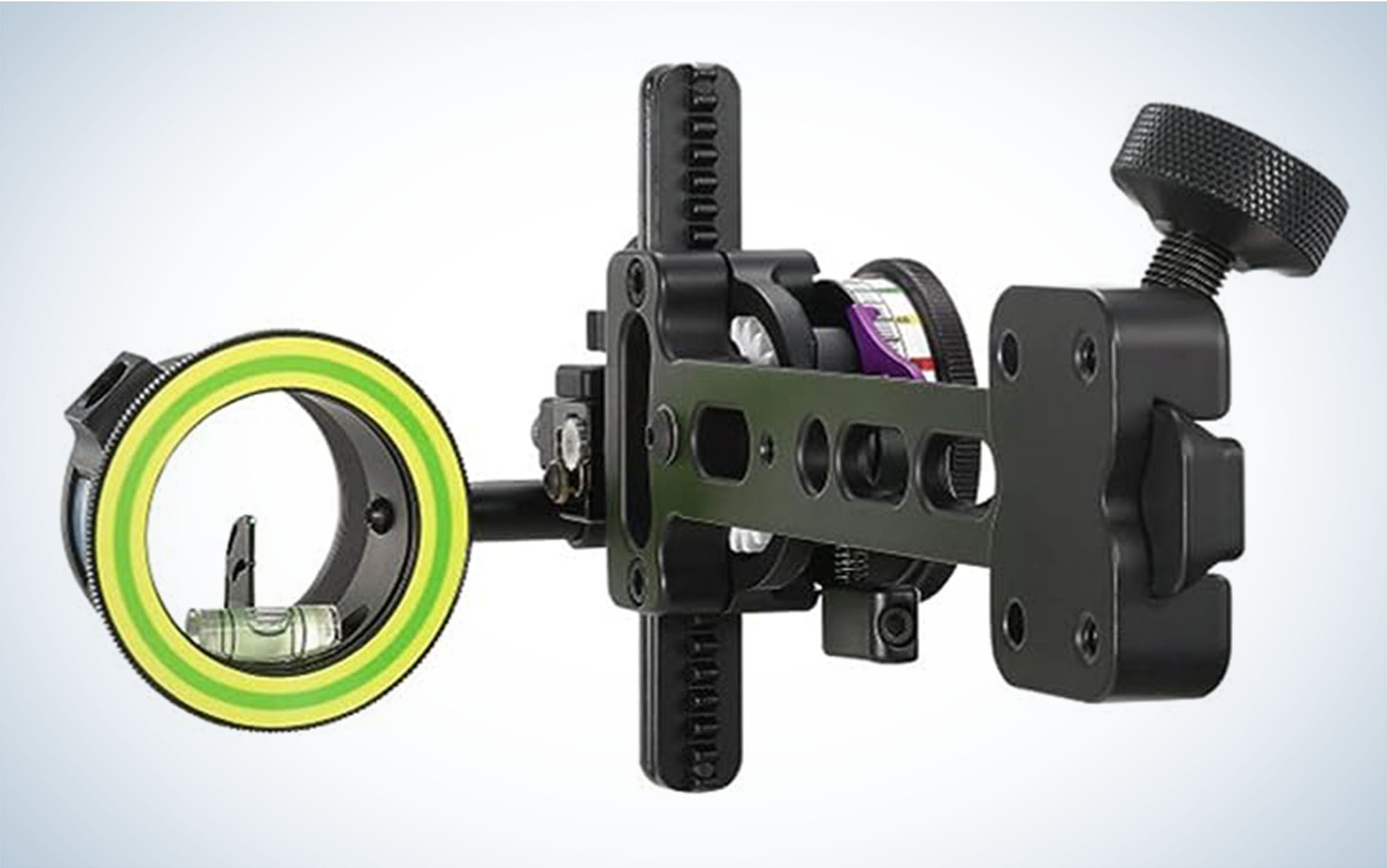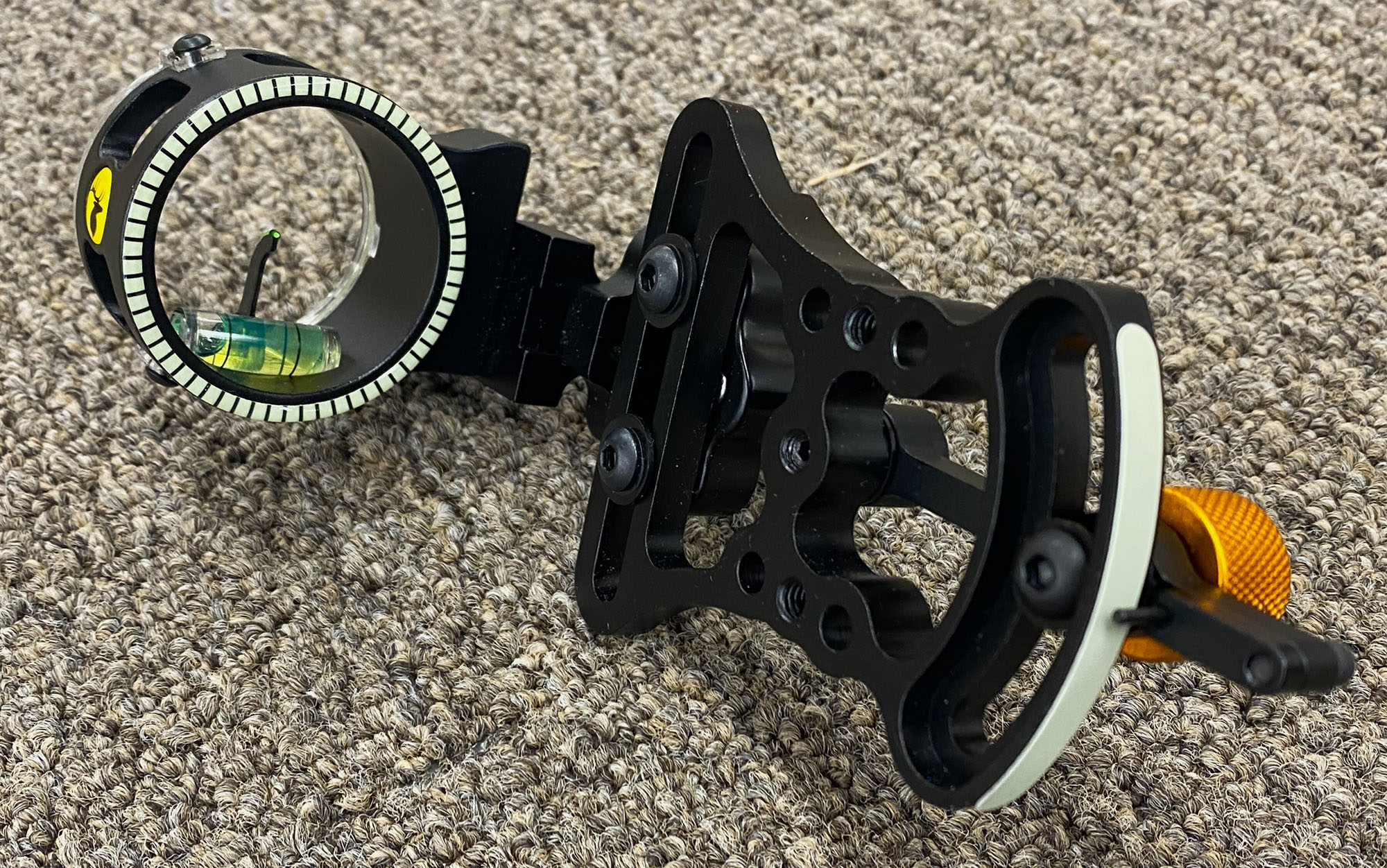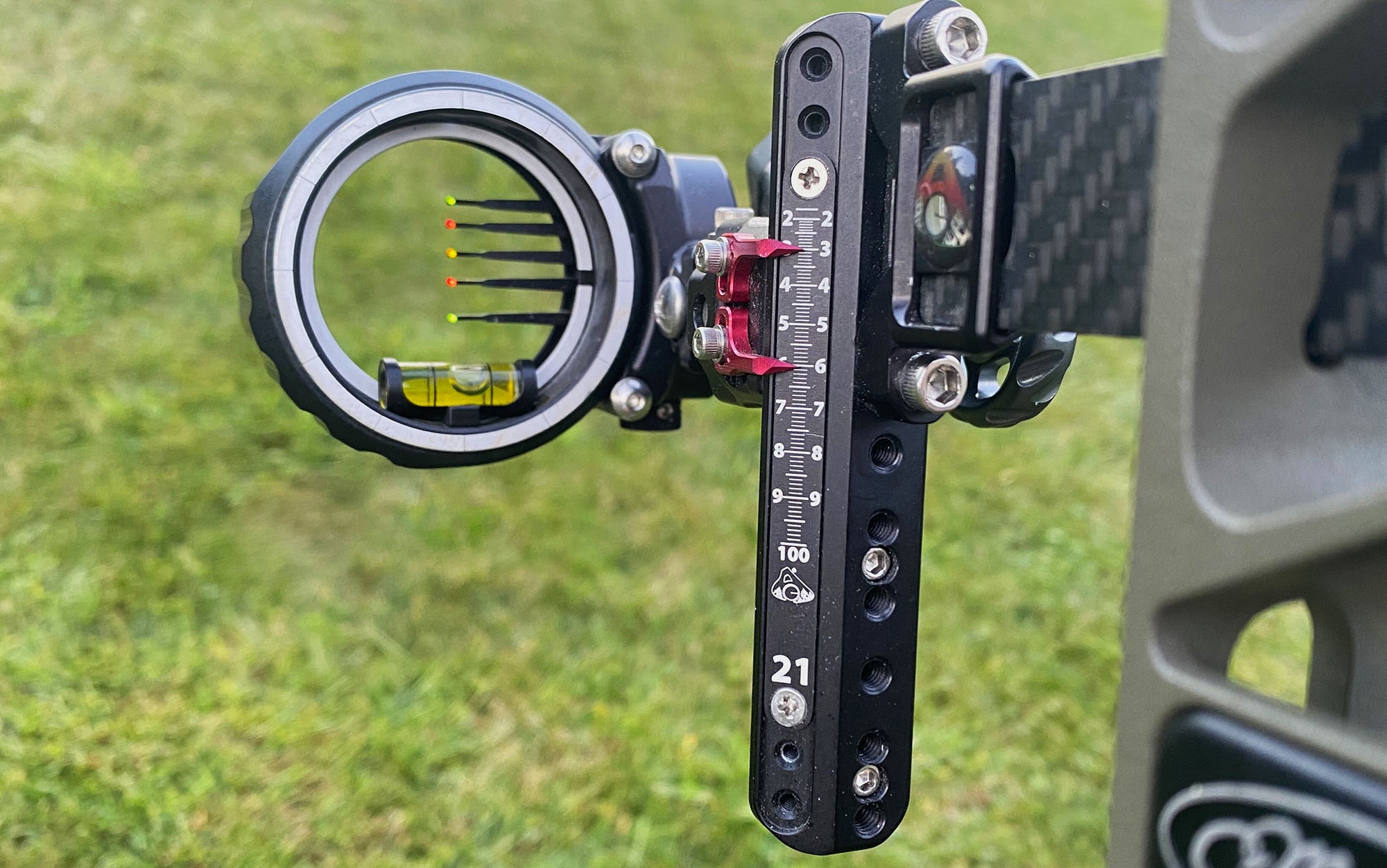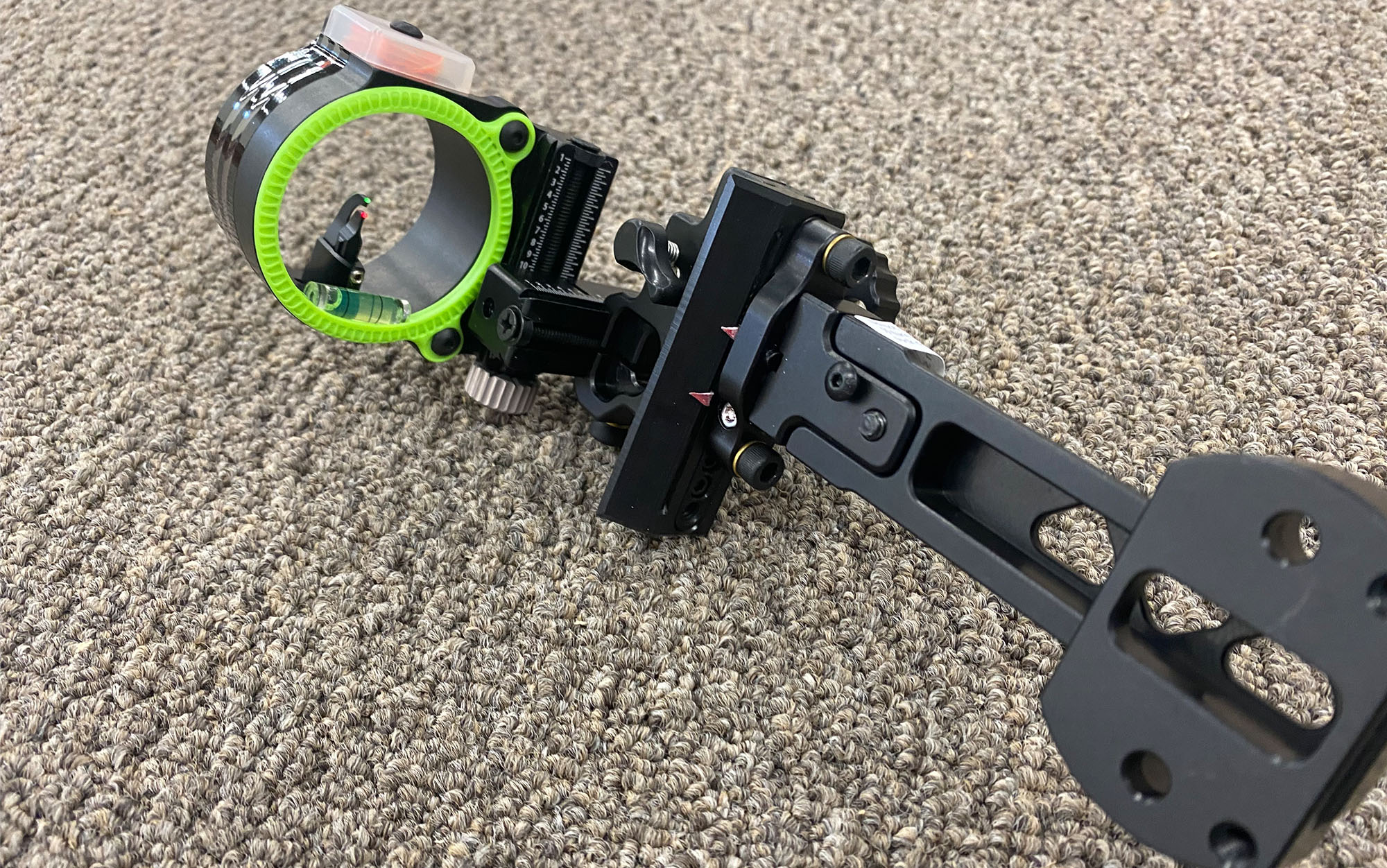We may earn revenue from the products available on this page and participate in affiliate programs. Learn More ›
Published Sep 8, 2023 1:32 PM
There was a time when bowhunters spent as much time learning to judge distance as they did shooting their bows. That was when rangefinders were big, cumbersome, expensive, and inaccurate. During those days, bowhunters also learned to “gap shoot.” That is, how to aim at a 35-yard target when your closest pins are 30 and 40 yards.
Judging distance and gap shooting are fast becoming relics. Most bowhunters today carry rangefinders, and want to dial their sight to the exact distance. This is the world where single and multi-pin slider bow sights are king. While slider sights started out as single-pin sights, bowhunters now demand multiple pins. They want the speed of multiple aiming references combined with the precision of dialing to the half yard.
The market has responded with a plethora of sight options available. Here’s my list of the best single-pin and slider bow sights out there.
How I Chose the Best Slider Bow Sights
In choosing the best slider sights listed here, I relied heavily on my experience working the past 10 years at Lancaster Archery Supply—one of the largest archery retailers in the world. At Lancaster, I see almost every sight on the market, and I get to play with many of them. Plus, selling so many bow sights, we see which sights come back with issues, and which ones don’t. That’s valuable intel when determining which sights can take a beating, and also in figuring out what makes a sight bullet-proof.
Best Slider Bow Sights: Reviews & Recommendations
Best Overall: UV Slider
Key Features
- Three primary pins, plus a bonus long-distance pin
- Sight tape indicators for each pin
- Large scope adjustment wheel
- Sight lock strategically located for easy access
- Individual mounts for Bridgelock, Picatinny, and standard riser
- Light kit included
Pros
- Can be adjusted fast
- When set properly, you will know the exact distance each pin is set for at all times
- One adjustment to set both first and second axes
- Fully rigged UV3XL scope included
- Adjustment wheel lock can be overridden
Cons
- Expensive
- Can’t get .019 sight pins in the Slider Edition configuration
The UV Slider is the newest slider bow sight on the market, having just launched in mid-August. It’s the culmination of two years of work by Ultraview’s engineers and pro archers who wanted to build their own sliding sight, without the typical issues many bowhunters have with them.
The engine of the UV Slider is the Dual Dial, which consists of a rubber-coated yardage adjustment wheel that houses a smaller wheel for making windage adjustments. Both adjustment controls are nested together, eliminating much of the bulk typically associated with slider sights.
The gears driving the adjustment wheel have tight tolerances, so there’s no slop or play when the yardage wheel gets turned. The locking knob is curved and placed on top of the wheel, precisely where your index finger rests when you grab the wheel to adjust it. So you can flip the lock and then turn the wheel seamlessly. When you’ve turned the wheel to your desired setting, your thumb is positioned to push the lock back down.
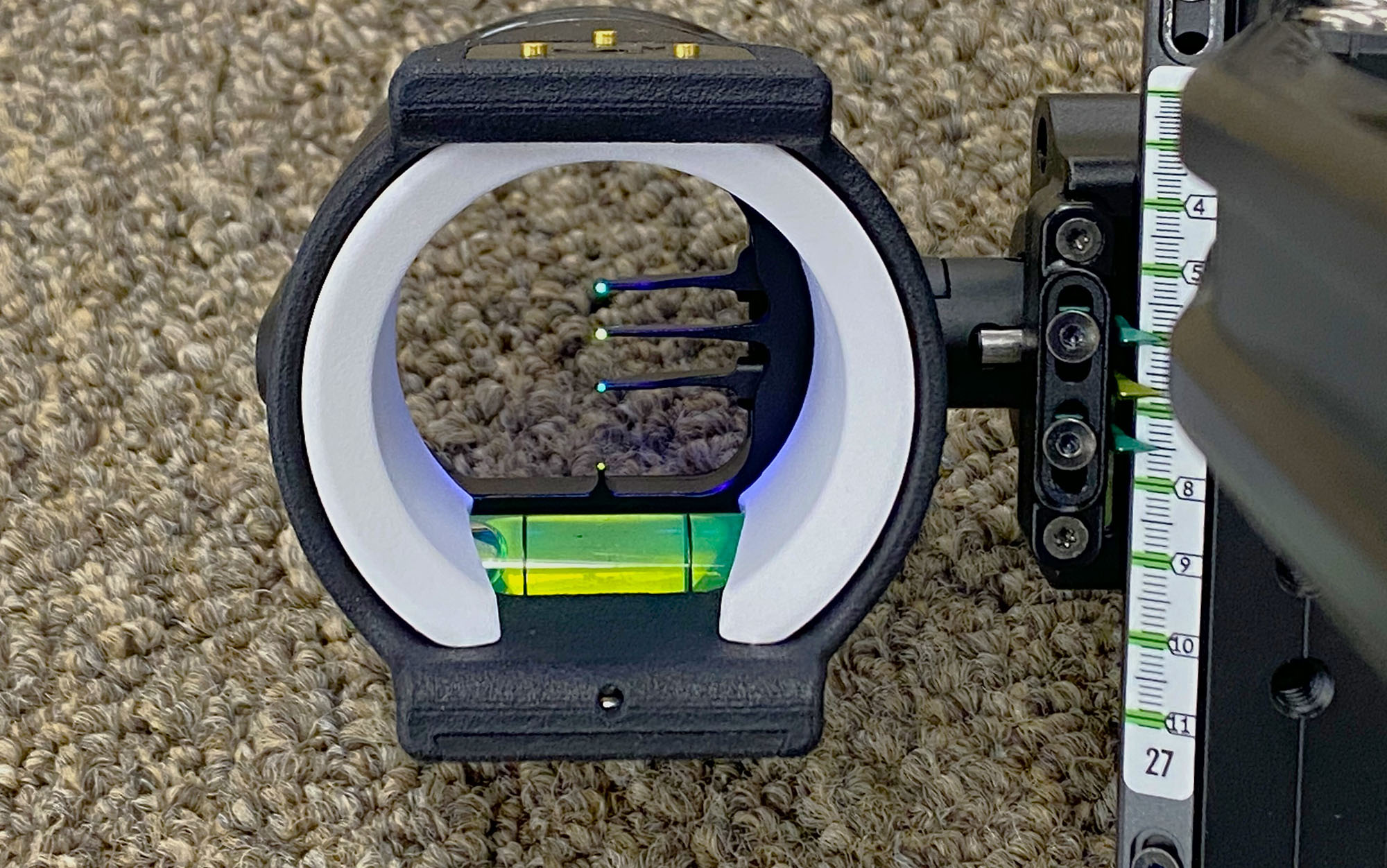
Even when the lock is engaged, you can override the lock by applying extra pressure to the yardage dial. This is a design feature for in the event a hunter is in a hurry and forgets to flip the lock. The scope is an improved version of the UV3XL scope that’s been out for a couple of years. It’s built around removable cartridges, with one up front containing a light kit to illuminate the pins. The light cartridge can be pulled out and replaced with a simple, white sight ring if you’re hunting a state that doesn’t allow battery-powered sight lights.
In the rear of the scope is a cartridge containing three primary pins, plus a bonus fourth pin sitting on top of the scope level. The center pin of the three main pins is fixed in the center of the scope, but the pins above and below are adjustable. Similarly, the pin indicators on the yardage scale feature a center, fixed pointer, and adjustable pointers above and below. Ultraview calls this their Triple Mark, and it essentially makes this a sight where all three pins can be set how you want them, and when you refer to your sight tape, you’ll know the distance for which each is set whenever you turn the yardage wheel.
The indicators used for Triple Mark are insanely sharp and sit as close to the sight tape as physically possible. Both features mean you’re getting the most accurate distance indication possible.
Ultraview makes single-pin and double-pin cartridges that can be bought to replace the four-pin cartridge that comes with the UV Slider, if you prefer one of those setups. And if you want .019 pins, you’ll have to go to one of those cartridges, because the Slider Edition scopes have three .015 pins, and the bottom pin is .010.
There are versions of the UV Slider designed to fit bows with Bridgelock sight-mount options, Picatinny mounts, and standard riser-mounting holes.
Best Single Pin: Spot Hogg Fast Eddie XL
Key Features
- Oversized gear system for adjusting scope
- Bladed, single vertical pin
- Interchangeable outer scope rings
- Quick-release locking knob
- 6-inch dovetail bar
Pros
- Only one aiming reference
- Built like a tank
- Easy to adjust for distance
- Super bright fiber
- Can remove scope and sight bar from bow for travel
Cons
- Only one aiming reference
- One of the heaviest sights on the market
The Spot Hogg Fast Eddie XL MRT is a true, single-pin sight. It’s got just one aiming reference that you adjust to get your aiming point.
In recent years, sight manufacturers have added multiple pins to their single-pin sights. It’s something a lot of bowhunters have demanded. They like moving their sight pin to the exact yardage they want to shoot, but they also like having more aiming references for fast shooting. There are others, however, who only want that one pin. They don’t want to get confused by having to choose between multiple pins and accidentally aim with the wrong one. They want one.
The Fast Eddie XL comes in many variations with multiple-pin options, but it can still be bought with a single, vertical pin. That pin features a ton of super-bright fiber, and it’s housed in a scope featuring Spot Hogg’s “multiple ring technology.” Each sight comes with two rings that screw onto the outside of the scope, facing the archer. One ring is smaller than the other, allowing the archer to frame the scope when looking through their peep sight.
Two primary features vaulted the Spot Hogg Fast Eddie to the top of this sight category. First is the “bullet-proof pin.” Spot Hogg was the first to put a bladed pin inside their scopes, as opposed to a thin metal wire. These things don’t bend, and they protect the fiber wonderfully.
The second reason is the oversized gear system Spot Hogg employs to drive the scope up and down. It’s built like a tank, yet it’s super accurate. There is no play in the gear when you turn the Fast Eddie’s wheel. When the wheel stops, the scope sits in one place. There’s no wiggle room up or down.
The XL version of the Fast Eddie features the 6-inch dovetail mount, which allows the archer to slide the sight toward or away from the riser to get the field of view right through the peep. Also, you can remove the whole scope and sight bar from your bow for traveling, and then put it back without having to sight in again.
Like other Spot Hogg sights, the Fast Eddie XL is notoriously built to survive the harshest hunting conditions. It can take a beating, but its all-metal, durable construction explains why it’s so heavy.
Best Budget: Trophy Ridge Pursuit One Pin
Key Features
- 100 percent aluminum
- 14 inches of .019 fiber
- Can adjust to level second and third axes
- Quiet
- Lever-action adjustment bar
Pros
- Costs under $100
- No plastic parts
- Pin is bright
- Simple to set up and to use
Cons
- Yardage indicator isn’t terribly precise
- You mark your own distances on the sight tape
The Trophy Ridge Pursuit One-Pin sight is an all-metal, no-frills, sliding sight for bowhunters who have to set up a bow within a certain budget. Not everyone can spend $600 on the latest and greatest sliding sight. This one can be yours for under $100.
In the Pursuit, you will get an all-aluminum, durable, and dependable sight. It’s not going to break into 100 pieces if your bow falls over at the target range. You loosen a large knob to unlock the adjustment arm, which you press down to raise the scope for shorter distances, or lift up to lower the scope for longer distances.
The sight features a glow-in-the-dark scope ring and sight tape. Both features seem to wear out rather quickly, but I think they’re irrelevant. They do their job just by being bright white. What is nice is the fiber optic used for the pin. There are 14 inches of it wrapped around the scope, so the pin is nice and bright when the light is poor. A blue, rheostat light is included with the sight, with batteries.
Not many sights in this price range allow for the second and third axes to be adjusted, which is something that makes the Pursuit unique. And since the sight features Delrin washers on all moving parts, the Pursuit is virtually silent when you make adjustments for distance in the field.
Let’s not mince words here. The Pursuit is a basic sight. At most, the pin will sit 4 inches from where the sight is bolted to the bow. That’s short. Unless you move your peep sight, there probably isn’t enough vertical adjustment to be able to shoot beyond 80 yards with most bows. There are also no micro adjustments. You will have to make your own yardage marks on the blank sight tape that’s included. And the yardage indicator is kind of big, so your yardage reference isn’t going to be very precise.
But the Pursuit will give you a fully functional, durable, affordable sight for your hunting rig. If you’re not planning to take hunting shots beyond 50 yards or so, this sight will likely do everything you need it to do.
Best 5-Pin Slider: Axcel Landslyde Carbon Pro
Key Features
- Five individually adjustable pins
- Dual sight-tape indicators
- Adjustable dead stop allows fast return to the home position
- 6-inch carbon bar
- Micro adjust elevation and windage
- Movable rheostat cover
Pros
- Allows five set aiming references, two of which are also movable
- Built like a tank
- Can adjust first, second, and third axes to make sure everything is level
- Allows for shooting well over 100 yards
- Comes with eight, double-sided metal sight tapes
Cons
- One of the most expensive sights on the market
- Adjustment wheel is not as big as other sights
For the past two years, the Axcel Landslyde has been one of the hottest sights on the market. It’s a sight that offers the best of both worlds. Set five pins for predetermined distances—say, 20, 30, 40, 50, and 60 yards. Move the adjustable hard stop to the top of the slider rail so that you can blindly turn the wheel to raise the scope up to the stop, and then you know all your pins are now locked at those pre-set distances.
There are two sight-tape indicators so you can make two of your pins sliding pins. For example, set one indicator to match your top pin, so you can use that to dial in your pin to any distance out to 60 yards. Set the other indicator to match your bottom pin, so you can dial in that pin to any distance from 60 yards and farther. Now you’ve got five fixed pins to cover you from 20-60 yards, and two sliding pins to cover you from 20-100 yards and possibly farther.
The adjustment wheel to move the whole scope is smaller than most other high-end slider sights on the market. But remember, this is a five-pin sight. You don’t need to move the scope for every shot. When you do, it’s purposeful, so you won’t have trouble adjusting.
The Landslyde’s scope features insanely bright pins because the fiber for each pin wraps multiple times around the outside of the scope. If you need to quiet those pins due to starbursting, there is a sliding rheostat cover that will make them dull.
Each pin can be micro-adjusted by a unique system employing one adjustment knob. Each pin is locked in place by a set screw. Loosen that screw, and the adjustment knob moves it up or down. Tighten the screw, and it’s locked back in place.
The Landslyde is one of the few sights on the market with sufficient left-right adjustment that you can use in the Mathews Bridgelock mounting position, or bolted to the side of the riser on other bows, without needing a special bracket. If you’ve got one of the bows with a Picatinny rail mount, there is a special version of the Landslyde made just for that mount.
Best Multi-Pin, Vertically Stacked: Black Gold Pro Dual Trac Dovetail
Key Features
- Two pins stacked vertically
- One pin is fixed, while the second can be micro adjusted
- Dual sight-tape indicators
- Weighs 9.4 ounces
- Super bright pins with tons of fiber
- Pro Pin is extra thin at the throat to minimize target block
Pros
- One of the lightest multi-pin sliders on the market
- Lower pin can be set to sit where you want it
- Dual indicators allow for two aiming references
- Solid build
- Comes with 54 stick-on sight tapes
- Fits Bridgelock risers or can be bolted to the side of standard risers
Cons
- Expensive
- Adjustment wheel could be bigger
The Black Gold Pro Dual Trac Dovetail is an excellent choice for bowhunters who want a multi-pin slider with vertically stacked pins. This is a two-pin, vertical sight, which I believe is best when it comes to sights with vertical pins. When you have three vertical pins and you use the bottom pin, the posts holding the other two pins block a considerable amount of the target.
The Black Gold Pro Pins employed for this sight have extra skinny posts when viewed from the archer’s perspective. The pins are bladed, so they’re still strong. But they’re thin when viewed from the front to minimize target block.
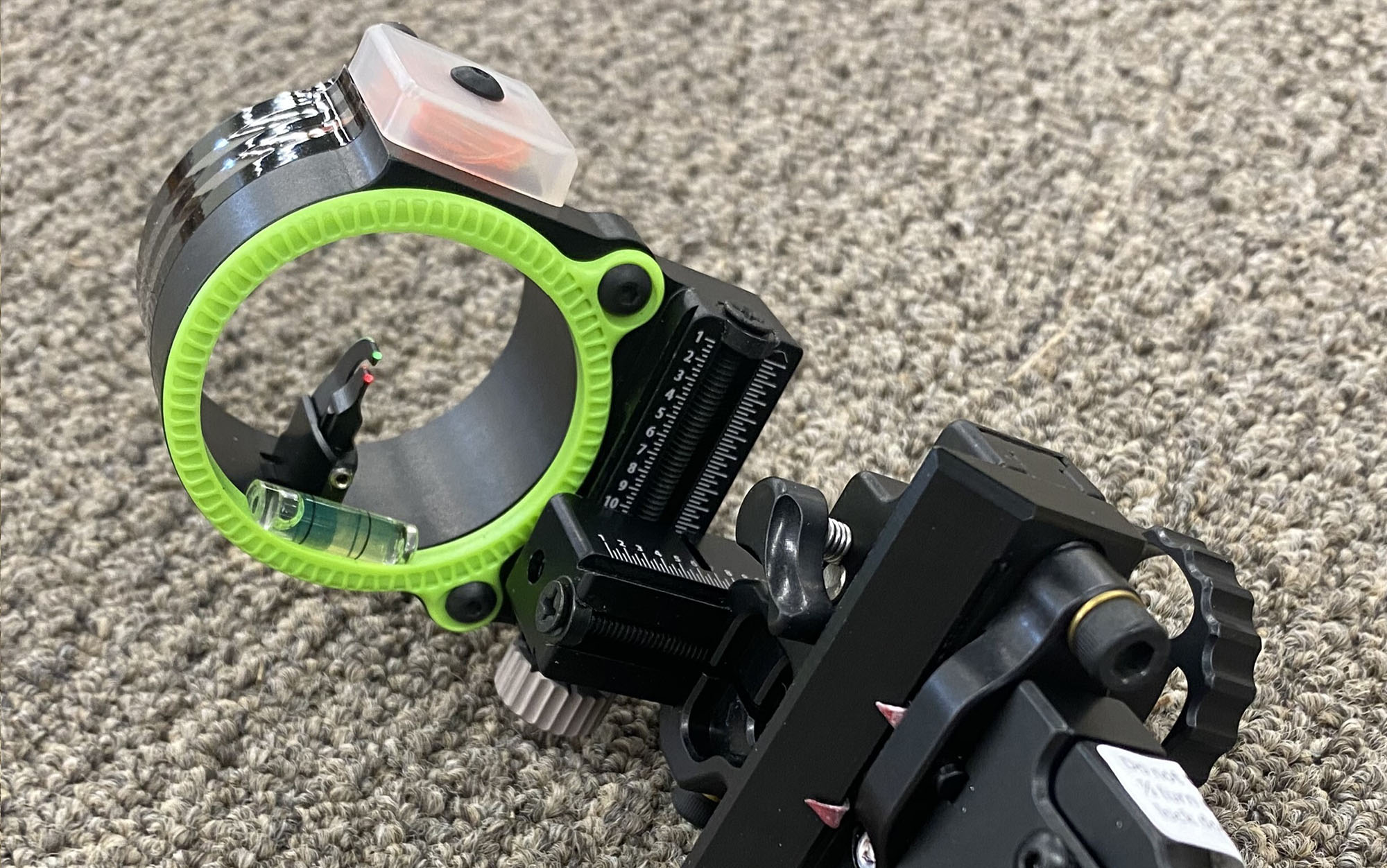
The top pin is the primary aiming reference, and its position is fixed in the middle of the scope housing. The lower pin, however, is micro adjustable up and down so you can set it where you want it. Two sight-tape indicators are adjustable so you can get them to point where you want on your sight tape. Once set, you can know the exact distance of each pin as you adjust the elevation wheel.
Black Gold is known for super bright pins, since they include a ton of fiber for each pin. And that fiber is coiled in a clear plastic housing that sits on top of the scope to gather as much light as possible.
Made from aluminum, the Dual Trac Dovetail weighs only 9.4 ounces, making it one of the lightest multi-pin sliders on the market. Many similar sights can be pretty heavy. If you’re rucking into the backcountry, and want to keep your gear as light as possible, this sight is a great choice.
Since the sight mounts via dovetail, you can adjust the distance it sits from your riser to get the best sight picture, and you can remove the sight from your bow for traveling to keep it protected.
This sight can be adjusted to level it on the first, second, and third axes.
Read Next: Best Bow Cases
How to Choose a Slider Sight
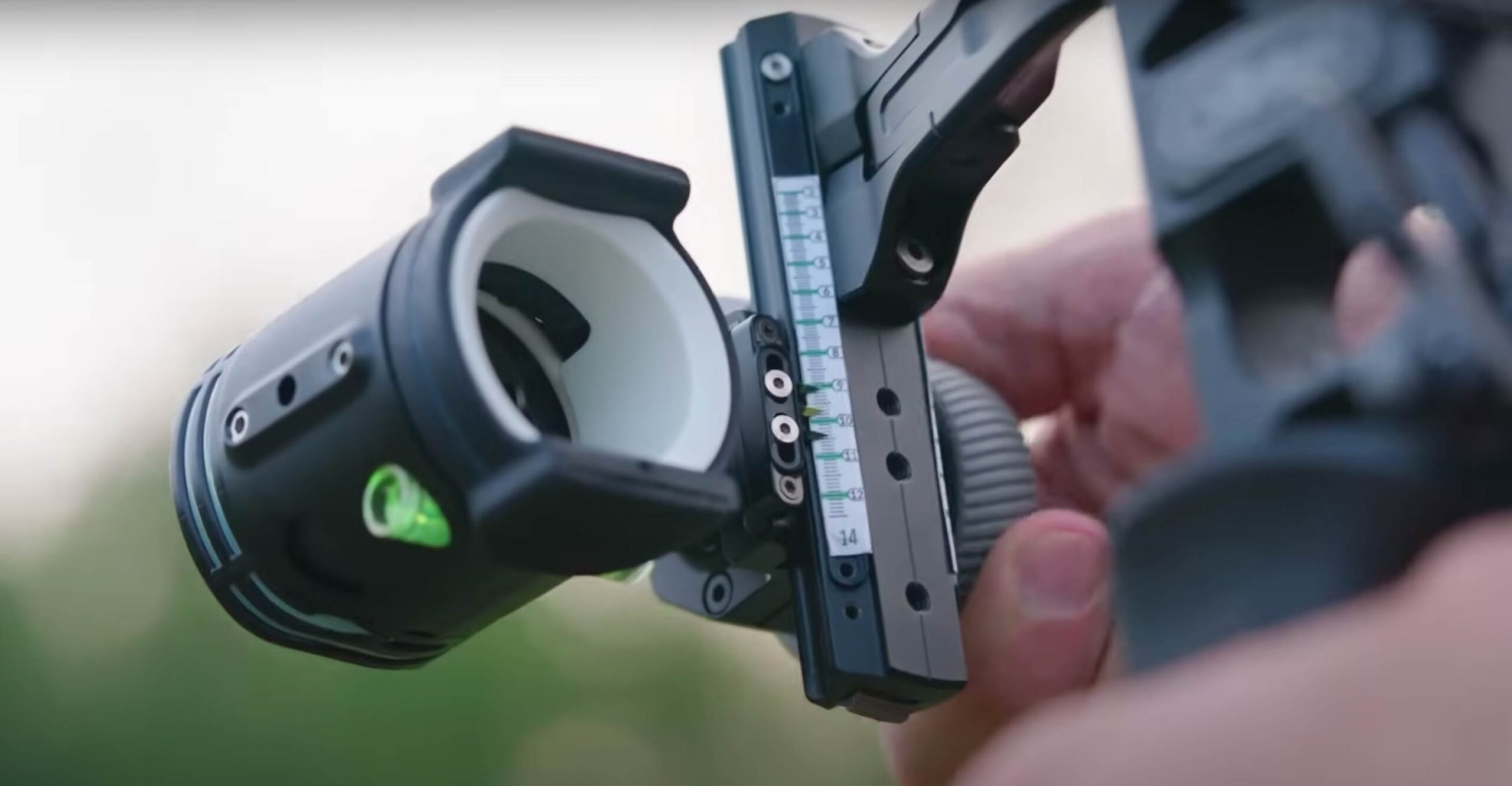
Precision Adjustment
These sights are meant to be adjusted up and down so you can shoot with pins set at exact distances, and/or to extend your range. You want to know exactly where your sight pin is sitting, so you need a wheel or lever arm that has no play or “slop” in it. You should be able to move the sight precisely without any wiggle room up or down. And when you lock it in place, you want it to stay in place.
Precise Indicators
Precision adjustments are only as good as the indicators that tell you where you are on the sight tape. You want sharp indicators that sit close to the tape. If they are blunt, you can have trouble identifying exactly where your sight is set. The farther away from the tape they sit, the more inconsistency there can be in identifying exactly where your sight is set.
Ergonomics
Again, slider sights are meant to be adjusted. So you want the locks and adjustment wheels or levers located in places where you can reach for them without thinking about it. In the heat of the moment, if you’re fumbling with locks or adjustment features—that’s bad. You want them to come to the hand, and be manipulated, easily.
Typical Sight Features
Slider sights are still bow sights, so you want all the features that you’d want in any bow sight. You want lots of fiber to see the pins in low light. You want to be able to level the sights on the three axes, so you know you can trust your bubble in all situations and angles. Good sturdy pins that won’t bend if a stick pokes through the scope housing are expected. You want a sight that looks and feels durable—like it can survive a couple hunting seasons.
FAQs
Q: If I get a slider sight, why would I want more than one pin?
In bowhunting, you must prepare for the unexpected. Let’s say you range that bull elk at 40 yards, and set your sight accordingly. You come to full draw, and he suddenly takes a few hops away. With multiple pins, you at least have other aiming references available if there’s not time to let down, range again, and move the sight.
Also, more pins mean more distance. Any pins you have under the top one extend your range, enabling you to shoot farther with a dedicated aiming reference.
Q: How much do slider sights cost?
We have sights listed here ranging from $90 to $600. Slider sights are a bit more technologically involved, so you can expect to pay more for one as compared to a fixed-pin sight. As with anything, the fewer features a sight has, the less expensive it is, and vice versa. The middle of the road in this sight category is around $300.
Final Thoughts on the Best Slider Bow Sights
Slider bow sights have become more and more popular over the years as rangefinders have become standard bowhunting gear, and the art of gap shooting has faded. Many bowhunters want to dial a pin to the exact distance they’re shooting so they can aim directly behind a sight pin. There’s no question there’s value in having that availability. Find the right sliding sight that matches your hunting style, and you just might find yourself shooting better than you ever have before.

